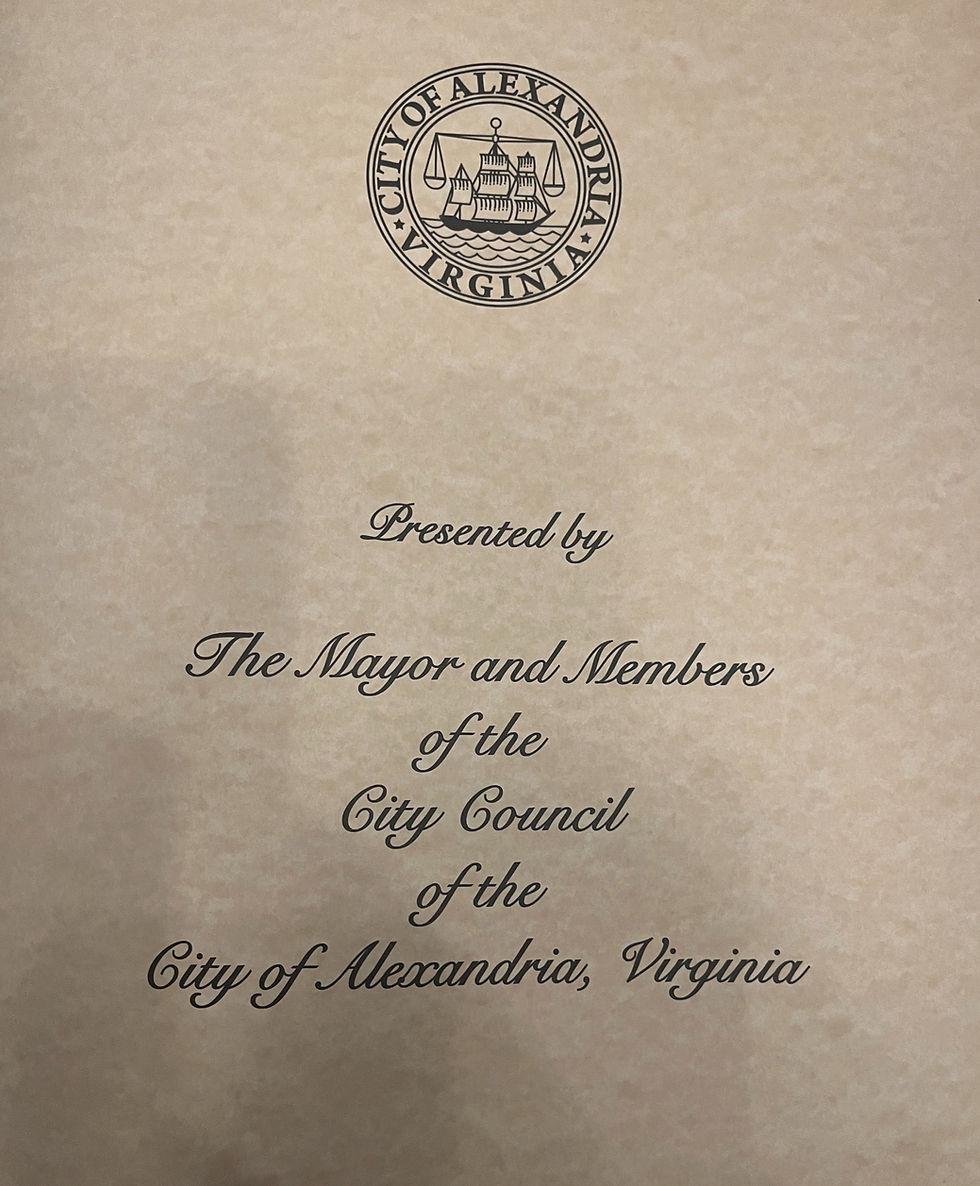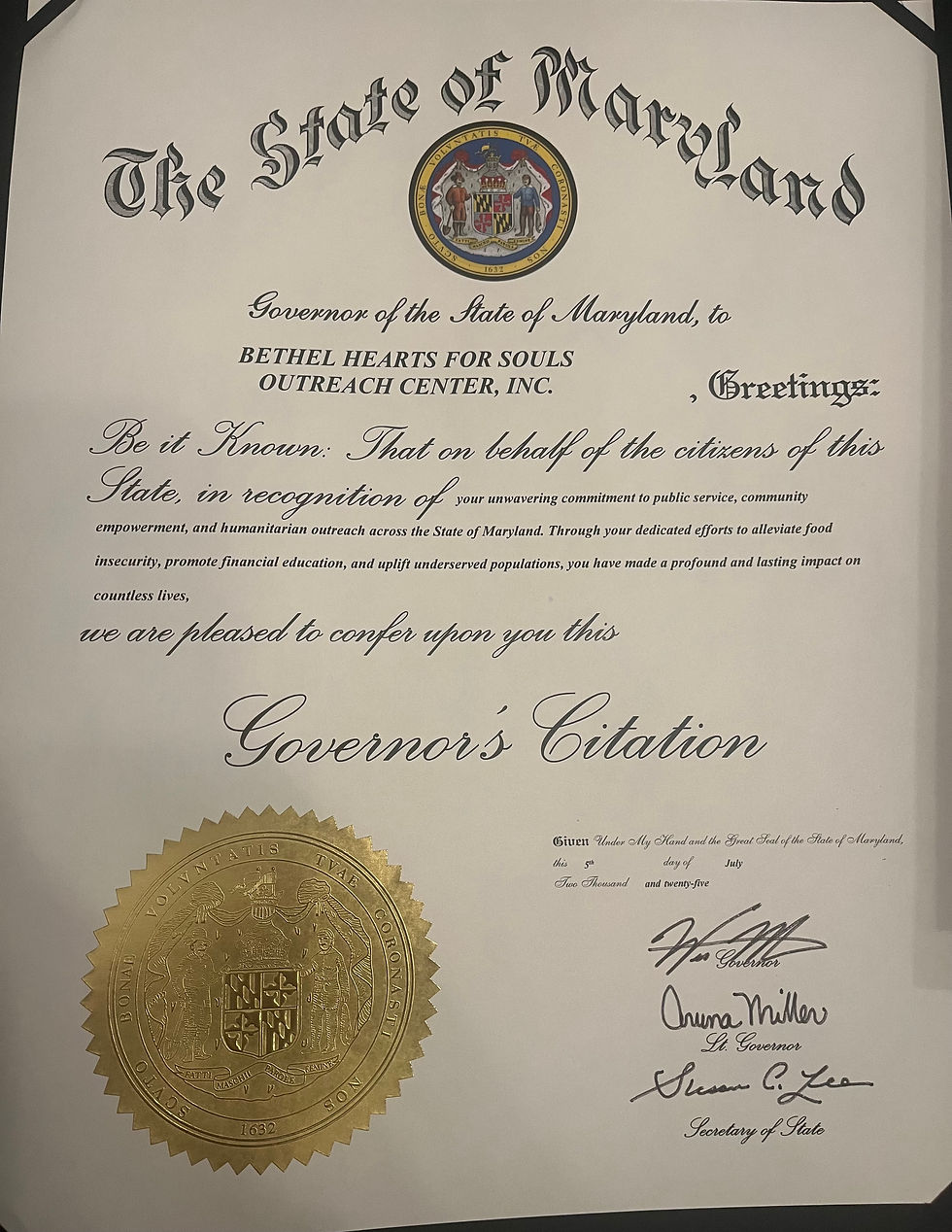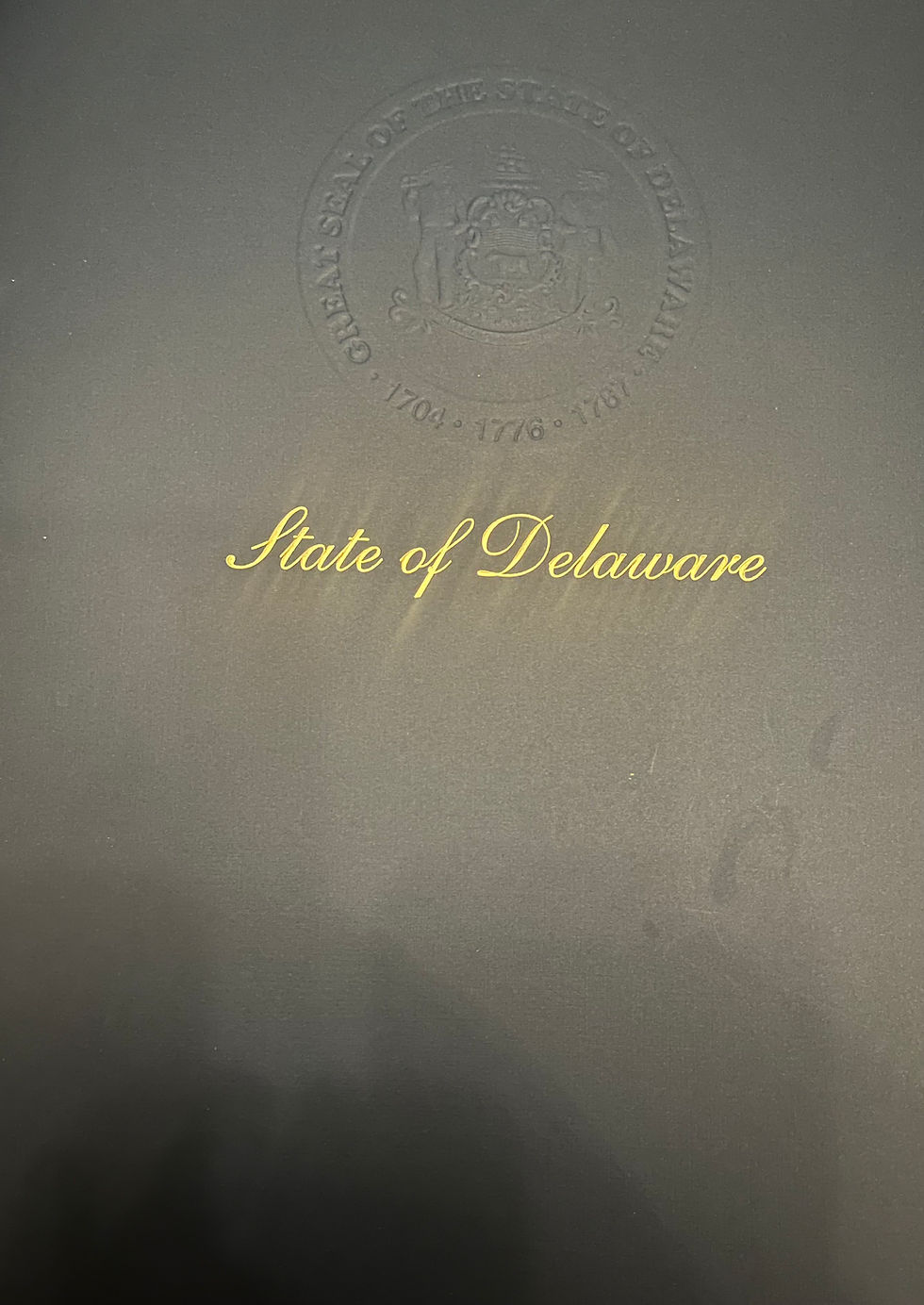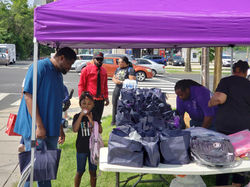





Bethel Hearts for Souls Outreach Center
Bethel Hearts for Souls Outreach Center
The mission of the Bethel Hearts for Souls Outreach Center food pantry is to offer healthy, nutritious food at no cost to Neighborhood residents and Community in need, while always treating our clients with the highest level of dignity and respect and financial education.
In addition to the unemployed and homeless, there is a large number of working poor and elderly residents whose monthly incomes do not cover their expenses. These individuals and families earn a minimum wage or are retired on fixed minimum incomes.
Particularly hard hit are low income families and single parents with young children. According to our local census, one in six residents' falls below the poverty level. Even more distressing is that the rate of poverty is 50% higher in our area than in the general city population.
WHAT IS FOOD INSECURITY?
•Food insecurity is the condition of not having regular access to enough nutritious food for a healthy life.
FOOD INSECURITY IN CHILDREN:
•Hungry children are sick more often, more likely to suffer growth impairment and incur developmental impairments that limit their physical, intellectual and emotional development.
•Hungry children perform more poorly in school and have lower academic achievement.
•Hungry children have more social and behavioral problems, as well as less energy for complex social interactions and cannot adapt to stresses as easily.
DISTINCTIVE TARGET GROUPS
-
Seniors
-
Families
-
Students/Youth
-
Military/Veterans
SCOPE OF PROJECTS
-
Our project is National
-
Our project is Statewide
-
Our project is Local/City
Our Corporate Partners:
- Dunkin’ Joy in Childhood Foundation
- Albertsons Companies Foundation
- Washington Gas
- AE Foundation Community Grant
- Labcorp Charitable Foundation
- The Wawa Foundation Inc.
- Walmart
-
Capital Area Food Bank
- Food Lion Feeds
- Giant Food
- Schreiber Foods
- Bombas Donation Products
- Nutrien, Inc
- ALDI Cares
- Ross Stores, Inc.
- Sheetz , Inc
- Costco
- Wegmans
- Whole Food Market
- C&S Wholesale Grocers Inc.
- Office of Emergency Management
- Weis Markets
- GIANT MARTIN'S
- Operation Warm
- Operation Gratitude
- I Support The Girls
- The Kendra Scott Foundation
- Designer Brands Inc.
- Bass Pro Shops and Cabela’s
GEOGRAPHY COVERAGE - USA
Our project is outside of continental US
Our project is of International scope (inside and outside of continental US)
Our project is National in scope (National presence in continental US)
Our project covers the Midwest (IA, IL, IN, MI, MN, MO, ND, OH, SD, WI)
Our project covers Mountain West (CO, ID, KS, MT, NE, NV, UT, WY)
Our project covers the Northeast (specifically DE, MD, NJ, PA, or WV)
Our project covers the Southeast (specifically GA, KY, NC, SC, TN, or VA)
Ways to Give
Ways to Give
Donate: Support our mission on the Streets

Reach us by mail:
Bethel Hearts for Souls Outreach Center
P.O. Box 132
Temple Hills MD 20757-0132
or
4806 St Barnabas Rd, #132
Temple Hills, MD 20757-0132
E-mails
foodpantryinitiative@bhfsoc.org
bethelheartssoulsoutreachcntr@gmail.com
Organization's PRIMARY Mission
-
Food Insecurity
-
Community Services
-
Health and Wellness
-
Environmental Sustainability
-
Education (K-12) Health & Well-Being
Awards & Honors
-
Received the Presidential Lifetime Achievement Award 2024, 10,000 volunteer hours of service
-
Received the President's Volunteer Service Award Gold 2020 & 2023
-
Received the Community Quarterback Award, the Baltimore Ravens 2022 & 2023, 2024
-
Received an award from the Office of the County Executive 2023
-
Received an award from Prince George's County District 8 with Anderson-Walker, Monique 2021
-
Received an award from Mayor Muriel Bowser in Wash DC 2019, 2020, 2021,2022, 2023, 2024 & 2025
-
Received the Governor Larry Hogan Citation Maryland for Outstanding Community Service 2021 & 2022
-
Received from United States Senate Certificate of Congressional Recognition 2020
-
Received the Baltimore County Executive Citation 2020
-
Received the Governor's Volunteer Service Award 2019
-
Healing Communities USA Certified Reentry Facilitator 2023
-
Received the ARS Cares-Community Heroes 2023
-
Received an award State of New Jersey Office of the Governor 2025
-
Received the Proclamation award State of West Virginia 2025
-
Received a Citation award from the Office of the State's Attorney Prince George's County 2025
-
Received the Proclamation State of Delaware Office of the Governor 2025
-
Received a award City of Baltimore Certificate of Recognition 2025
-
Received a Citation award United States Senate Maryland Chris Van Hollen 2022, 2025
-
Received an award from Mayor Brandon M. Scott Baltimore City resident Certificate of Recognition 2025
-
Received the Governor Wes Moore Citation Maryland for Outstanding Community Service 2025






































 |  |  |  |
|---|---|---|---|
 |  |  |  |
 |  |  |  |
 |  |  |  |
 |  |  |  |
 |  |  |  |
 |  |  |  |
 |  |  |  |
 |  |  |  |
 |  |  |

KEY TERMS
DMV (or Greater Washington Area)
The DMV, short for DC-Maryland-Virginia, refers to the Washington, DC metropolitan area and includes the following jurisdictions: the District of Columbia; Montgomery and Prince George’s Counties in MD; Fairfax, Arlington, and Prince William Counties in VA; and Alexandria City, VA. (Within Fairfax County are included Fairfax City and Falls Church City. Within Prince William County are included Manassas City and Manassas Park City.)
Food Insecurity
Food insecurity, as defined by the USDA, is “a lack of consistent access to enough food for an active, healthy life.” Individuals who are referred to as food insecure in the report were identified, using the USDA’s standard eighteen-question screener, as having experienced one or more food-related hardships at any point during the past year. The screener is used to identify four levels of food security: food secure, marginally food secure, low food secure, and very low food secure. In this report, the first two categories are referred to as food secure, and the third and fourth categories are referred to as food insecure. The fourth category is referred to as severely food insecure.
Hunger
Hunger is a physical symptom of a lack of adequate food. It is not a quantifiable term, but rather a description of the result that reducing one’s food intake can have. Hunger and food insecurity are not synonymous, though they are closely related.
Inequity
For the purposes of this report, inequity refers to an uneven distribution of resources or opportunity relative to need. Unlike “inequality,” which assumes all people should receive equal shares of support from the systems around them, the term “inequity” assumes that systems should work in favor of those starting with lower resources and opportunity, not against them.
Social determinants of health
Social determinants of health (SDOH) are the conditions in the environments where people are born, live, learn, work, play, worship, and age that affect a wide range of health, functioning, and quality-of-life outcomes and risks. Categories of SDOH include economic stability, education, health care, neighborhood and built environment, and social and community context.
Hunger Report 2023
KEY POINTS
-
32% of all residents across greater Washington – more than 1.2 million people – didn’t always know where their next meal would come from.
-
In every county across the region, at least one in six people faced challenges getting enough to eat at some point last year.
-
Those experiencing food insecurity are employed at essentially the same rates as those who are not.
-
Nearly half of the region’s food-insecure population is experiencing at least one diet-related health condition – diabetes, high blood pressure or hypertension, or obesity.
-
Economic recovery for those hit hardest financially by the pandemic is lagging well behind those who were less impacted, widening preexisting inequities in our economy.

1 in 3 neighbors struggled to access enough food during the last year. Nearly 1 in 5 were severely food insecure.

Hunger is present in every part of our region.
shows at least 1 in 6 people in each county experienced food insecurity. In Prince George's County, almost half of residents struggled to access enough food.

shows that being employed doesn't exclude you from hunger: 76% of those who are food insecure in the Greater Washington region were employed last year, compared to 73% of those who were food secure.
Most workers showed signs of underemployment, reporting they are seeking higher wages and more hours.
Service Programs
Nutrition & Wellness
Bethel Hearts for Souls Outreach Center INC focuses on nutrition and wellness by providing healthy, nutritious food at no cost to community members in need. Their mission extends beyond food distribution to include financial education, chronic disease management, and programs that promote overall well-being.
Key Nutrition & Wellness Initiatives:
Food Pantry Services – Offering fresh, nutritious food to unemployed individuals, low-income families, single parents, and elderly residents.
Chronic Disease Management – Educating the community on healthy eating habits to help prevent and manage conditions such as diabetes and hypertension.
Wellness Programs – Providing resources that focus on self-esteem, confidence building, and mental well-being, particularly for young women.
Environmental Health – Initiatives aimed at protecting the planet while ensuring access to healthy food choices.
Groceries to Go
Groceries to Go is a vital program of Bethel Hearts for Souls Outreach Center INC, designed to provide fresh, nutritious groceries to families and individuals facing food insecurity. This initiative ensures that community members—especially low-income families, single parents, the elderly, and the homeless—have access to healthy food options without financial burden.
Program Highlights:
Free Weekly Grocery Distribution – Offering fresh fruits, vegetables, dairy, meats, and pantry staples.
Mobile Food Assistance – Delivering groceries to seniors, disabled individuals, and those with limited transportation.
Healthy Meal Planning & Nutrition Education – Teaching families how to prepare nutritious meals on a budget.
Emergency Food Assistance – Providing immediate support to those experiencing unexpected hardships.
Through Groceries to Go, Bethel Hearts for Souls Outreach Center INC continues its mission of combating hunger, improving health, and supporting the well-being of the community.
Senior Brown Bag
The Senior Brown Bag program at Bethel Hearts for Souls Outreach Center INC is designed to support low-income seniors by providing them with nutritious, easy-to-prepare groceries in a convenient brown bag. This initiative ensures that elderly individuals have consistent access to healthy food, promoting better health, independence, and well-being.
Program Features:
Monthly Brown Bag Distribution – Seniors receive fresh fruits, vegetables, whole grains, dairy, and protein-rich foods tailored to their nutritional needs.
Healthy Aging Support – Focused on providing low-sodium, heart-healthy, and diabetic-friendly food options.
Home Delivery for Seniors with Limited Mobility – Ensuring accessibility for those who are homebound.
Nutrition & Wellness Education – Helping seniors make informed food choices and maintain healthy lifestyles.
Through the Senior Brown Bag program, Bethel Hearts for Souls Outreach Center INC remains committed to fighting senior hunger and improving quality of life for older adults in the community.
Emergency Food Shelter & Homeless Services Support – DMV Statewide
Bethel Hearts for Souls Outreach Center INC is dedicated to providing emergency food, shelter, and homeless support services across the DMV (DC, Maryland, Virginia) region. Our mission is to ensure that individuals and families experiencing homelessness or food insecurity have access to nutritious meals, safe shelter, and essential support services to help them rebuild their lives.
Our Support Services Include:
Emergency Food Assistance – Providing free, nutritious meals and pantry staples to those in crisis.
Temporary & Transitional Shelter Support – Connecting individuals with safe housing options and resources.
Mobile Outreach Program – Delivering food, hygiene kits, and warm clothing to unsheltered individuals.
Case Management & Referral Services – Assisting with job placement, mental health services, substance abuse support, and housing programs.
DMV Statewide Collaboration – Partnering with local shelters, churches, food banks, and nonprofit organizations to maximize impact.
Our goal is to offer hope, stability, and a pathway to self-sufficiency for the most vulnerable in our communities.
Toiletry Drives
Support Youth in Need Through Our Toiletry Drives
For many children living in low-income households, access to basic personal hygiene products is a daily challenge. Bethel Hearts for Souls Outreach Center, Inc. is committed to changing that.
Our Toiletry Drives offer a powerful way for communities to come together and support underprivileged youth by donating new, unopened personal hygiene items. These essential supplies help promote healthy living, dignity, and confidence.
To expand our reach, we partner with community centers, universities, shelters, and other organizations serving children and families in need. Together, we build stronger communities—one care package at a time.
Join us in making a lasting impact.
Organizing a Drive
Host a Toiletry Drive for Bethel Hearts for Souls Outreach Center, Inc.
You can make a difference in the lives of youth and families in need! Individuals, social groups, universities, and companies are invited to organize toiletry drives in support of Bethel Hearts for Souls Outreach Center, Inc.
To get started, please contact Calvin Brooks at
📧 bethelheartssoulsoutreachcntr@gmail.com
Shipping or Delivery Instructions:
Collected items may be delivered or shipped to:
Bethel Hearts for Souls Outreach Center, Inc.
Attn: Calvin Brooks
5210 Auth Rd, Suite 4th Fl
Suitland, MD 20746
📦 Please include:
-
A complete inventory of donated items
-
The name of the individual or group making the donation
Need Toiletries for Your Organization?
We’ve partnered with agencies, shelters, and organizations across the U.S. to distribute hygiene supplies to those who need them most. If your organization is in need of toiletry assistance, reach out to us at:
📧 bethelheartssoulsoutreachcntr@gmail.com
Together, we can promote dignity, health, and community connection—one toiletry at a time.
Toiletry Assistance Available
We’ve proudly partnered with organizations across the U.S.A. to provide essential hygiene products to those in need. If your agency, school, shelter, or organization is in need of toiletries, we’re here to help.
📄 To request assistance, please complete the Toiletry Request Form
or
📧 Contact us at: bethelheartssoulsoutreachcntr@gmail.com
Together, we can ensure every individual has access to the essentials for healthy, dignified living.
Acceptable Toiletry Donation Items
All items must be new and travel-sized. No hotel samples, please. ✅ We Accept: Deodorant Lotion Feminine wash/wipes Shampoo & conditioner Sanitary napkins & panty liners Toothbrushes & toothpaste Floss Kleenex (travel packs) Cotton swabs & cotton balls Bath towels & wash cloths Soap/body wash Mouthwash Body spray Hair combs/brushes Drawstring bags Travel-size laundry soap Your thoughtful donations help us support youth and families with dignity and care.

Email: Please complete the form below to ensure the fastest response possible, or email bethelheartssoulsoutreachcntr@gmail.com
Contact Us
Email: Please complete the form below to ensure the fastest response possible, or email bethelheartssoulsoutreachcntr@gmail.com
Contact Us



